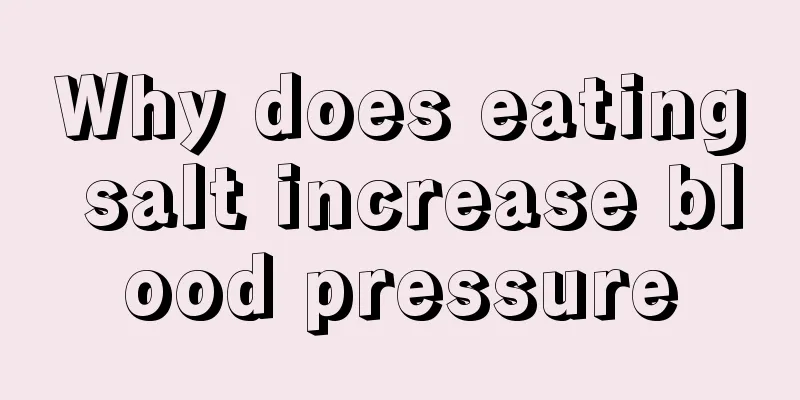Why does eating salt increase blood pressure

|
Hypertension has become a serious disease that endangers the health of modern elderly people. There are many causes of hypertension, among which diet is an important factor leading to hypertension. I believe that everyone has to add salt when cooking, but eating too much salt can cause many harms to the human body. Among them, high blood pressure is a direct consequence of excessive salt intake. So why does salt cause a person's blood pressure to rise? 1. Increased sodium intake in the diet can cause excessive sodium ions to be retained in the body. Sodium retention will inevitably lead to water retention, which increases the amount of extracellular fluid and increases blood pressure. 2. The amount of sodium ions in the extracellular fluid increases, and the concentration gradient of sodium ions inside and outside the cells increases, which leads to an increase in sodium ions inside the cells, and then intracellular edema occurs. The swelling of the smooth muscle cells in the walls of the arterioles causes the lumen to narrow, the total peripheral resistance to increase, and the blood pressure to rise. 3. The increase of intracellular sodium ions inhibits sodium-potassium exchange, allowing more calcium to enter the cell through voltage-sensitive calcium channels. The amount of calcium in vascular smooth muscle cells increases, the smooth muscle contracts, the peripheral resistance increases, and the blood pressure rises. 4. The increase in intracellular sodium ions reduces the electrochemical gradient of sodium inside and outside the cell, thereby reducing the outflow of calcium through the sodium-calcium exchange mechanism. 5. The increase in sodium ions in the presynaptic membrane cells of the sympathetic nerve terminals triggers the calcium-dependent release of norepinephrine, which in turn releases stored calcium. 6. High sodium intake increases sensitivity to the pressor effect of exogenous norepinephrine. 7. High sodium intake increases the number of angiotensin II receptors on the blood vessel walls. 8. High sodium intake increases the number of kidney α2 receptors. 9. High sodium intake excites the sympathetic nerve center, increases the content and uptake of norepinephrine in the hypothalamus, and increases the pressor response to stimulation of hypothalamic neurons. |
<<: Is it good to eat more salt in summer?
Recommend
What are the precautions for fixed dentures
Many people will always encounter a lot of inconv...
Lycopene tablets
Lycopene tablets have lycopene as the main ingred...
How to preserve fresh maple berries?
Fresh maple berries need to be stored properly. I...
What are the early symptoms of cervical cancer?
As the times progress, people's living standa...
What are the ways to prevent bladder cancer?
As people's awareness of things continues to ...
What to do if you have acne on your chest due to excessive liver fire
Many girls or boys will develop pimples on their ...
Will eating tofu make you fat?
We all know that tofu is a very common food in ou...
How to preserve pear pollen
Pollen mainly comes from a substance in the stame...
What are the early symptoms of cervical cancer? How to treat cervical cancer?
Cervical cancer is one of the most common maligna...
Is it useful to soak your feet when you have a cold? What is the best way to soak your feet?
For friends who have a cold, foot soaking is very...
Freestyle breathing techniques
We all know that swimming is a very good sport fo...
How to remove the marks left by cupping
Many friends who have had cupping treatments will...
Is black stain on teeth a sign of tooth decay? What are the symptoms of tooth decay?
There are many reasons for the appearance of blac...
Is endometrial cancer a malignant tumor?
Is endometrial cancer a malignant tumor? With the...
What is the method for making soap-free breast milk soap
Many mothers use breast milk to make soap-free br...









